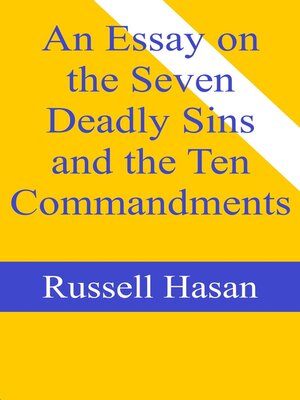
Sign up to save your library
With an OverDrive account, you can save your favorite libraries for at-a-glance information about availability. Find out more about OverDrive accounts.
Find this title in Libby, the library reading app by OverDrive.



Search for a digital library with this title
Title found at these libraries:
| Library Name | Distance |
|---|---|
| Loading... |
The thesis of this essay should not be shocking and controversial, but, for some reason, it is: and that thesis is the belief that the Bible is logical and makes perfect sense, and is not random hallucinatory gibberish, which some people believe, and which, the author is ashamed to admit, he used to believe, too, until he developed the wisdom articulated in this essay. The best way to understand the logic of the argument which the Bible makes is by means of the idea that the Ten Commandments are actually a prohibition against the seven deadly sins, which is made clear by a process that maps the seven deadly sins to the Ten Commandments. This is the map:
(1) Thou shalt not covet thy neighbor's house: gluttony.
(2) Thou shalt not covet thy neighbor's slaves: sloth.
(3) Thou shalt not steal. Thou shalt not covet thy neighbor's property. Thou shalt not bear false witness: greed.
(4) Thou shalt not commit adultery: lust.
(5) Thou shalt not covet thy neighbor's wife: envy.
(6) Thou shalt not kill. Honor thy mother and thy father: wrath.
(7) I am the Lord your God. You shall hold no others above me. Honor the Sabbath and keep it holy: pride.
Obviously, if this thesis is true, then neither the Ten Commandments nor the seven deadly sins should be taken literally at face value; instead, they are metaphors for a broader idea of religious ethics and morality, and some degree of interpretation and analysis is necessary to infer their true, deeper meaning, which the author describes as the wisdom of God. As one example, "honor thy mother and thy father" does not literally refer to one's parents at all, but, rather, is a general statement about appreciating the society into which one is born and not harboring resentment and hatred for that society, which is, after all, the world God made and the world God gave to you for you to live in, which, in a more direct sense, is the world which your parents made and which your parents gave to you for you to inherit, but the counterfactual of having this sense of honor towards one's parents and towards society is nothing other than the sin of wrath directed against it and them; many other examples are given in the pages that follow, and the story which unfolds has a beautiful symmetry in which each one of the Ten Commandments lines up with one of the seven deadly sins as its negative inverse.
This short essay, which can easily be read in under one hour, intends to provide that analysis of the wisdom of God, and to explore the interesting results of the map outlined above, which constitutes, in a very real sense, a map of the Bible by means of which one can navigate its contents.







